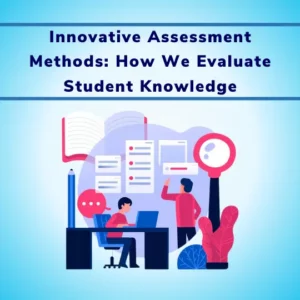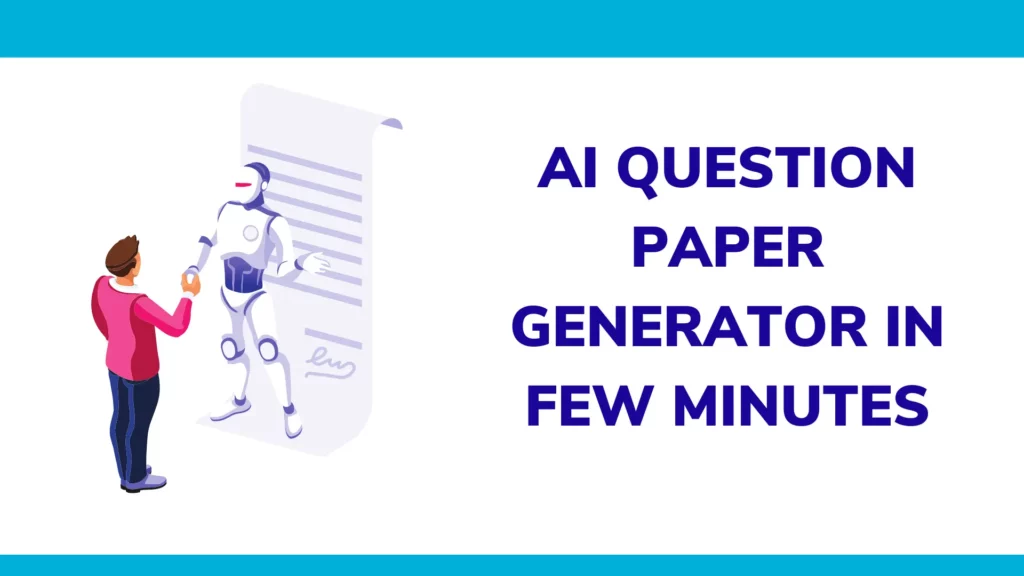
Article Contents
Introduction
Manual question paper generation is a tedious task, requiring a lot of time, effort, and attention to detail. The process involves going through a vast collection of questions, sorting them by subject and topic, determining their level of difficulty, and deciding on a suitable distribution of marks. This can be a time-consuming and error-prone process, especially when dealing with large volumes of questions.
With the advent of AI technology, this task has become much easier and more efficient. AI tool designed specifically for generating question papers; provides a streamlined and automated solution for this process. By leveraging the power of AI, it takes care of the heavy lifting, freeing up your time and resources to focus on other important tasks.
With an advanced AI Question Paper Generator, you can easily create question papers by inputting the subject and topic-wise weightage, difficulty level, and total marks. The software will then generate a well-balanced question paper that meets your requirements, taking into account the distribution of marks and difficulty level.
AI question paper generator comes up as a boon to teachers saving up their valuable time which would otherwise have been spent on Question paper generation.
According to recent studies, teachers spend an average of 10-15 hours each week on administrative tasks such as grading, lesson planning, and record-keeping. This takes away valuable time from their core responsibilities, such as preparing engaging lessons and providing individualized support to students.
Question paper generation is one such task that consumes a significant amount of a teacher’s time. The manual process of sorting through questions, determining difficulty levels, and deciding on a suitable distribution of marks can take hours, and often requires multiple rounds of revision to ensure accuracy and fairness. This can be a time-consuming and repetitive task, taking away from the creativity and energy that teachers need to deliver quality education to their students.
By automating this process with AI technology, teachers can save time and reduce the stress associated with manual question paper generation. This allows them to focus their time and energy on what really matters – providing the best possible education to their students.

Let’s have a look at the advantages of AI question paper generator
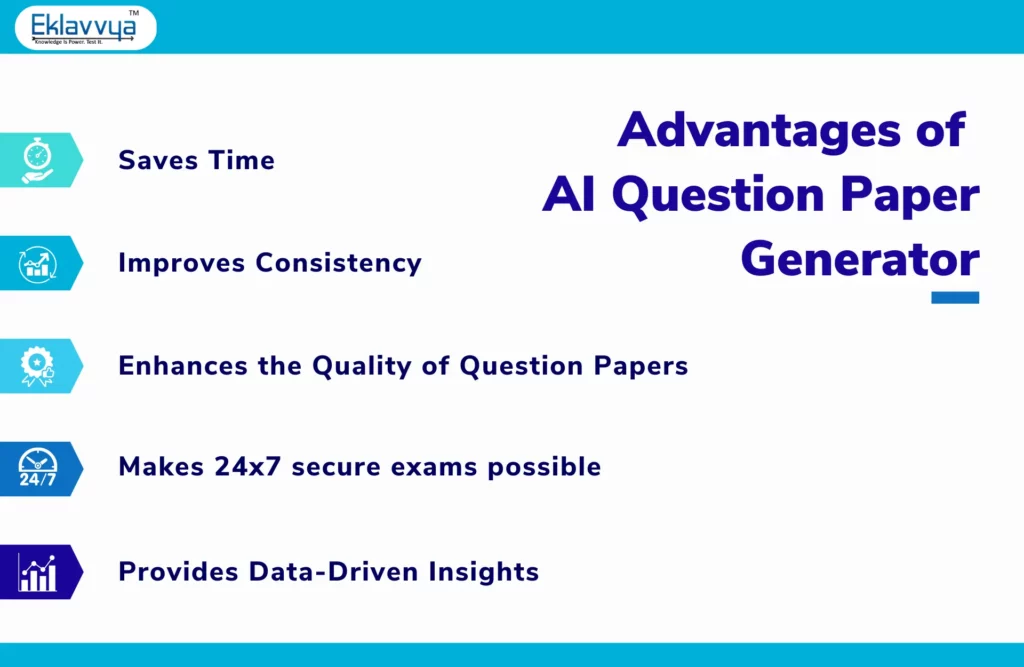
1. Saves Time
Automating the question paper generation process saves time and eliminates the need for manual, time-consuming processes. This allows teachers to focus on other important tasks such as preparing lessons and providing individualized support to students.
2. Improves Consistency
AI software can ensure that question papers are consistent in terms of difficulty level, subject and topic-wise weightage, and total marks. This reduces the risk of human error and helps to maintain the fairness and impartiality of exams.
3. Enhances the Quality of Question Papers
By using algorithms to sort through a large pool of questions, AI question paper generators can help to select the most relevant and high-quality questions for exams.
4. Makes 24×7 secure exams possible
In case you are delivering an online course, an AI question paper generator makes it possible to generate an unlimited number of unique question papers with the required difficulty level, subject, and topic-wise weightage. This nullifies the chances of question paper leakage as each student would attempt a unique set of questions of the same difficulty level and subject & topic-wise weightage.
5. Provides Data-Driven Insights
AI question paper generators when integrated with the online exam platform can collect and analyze data from exams, providing teachers with valuable insights into student performance, strengths, and weaknesses. This can help to inform future lesson planning and assessment strategies.
AI technology can positively impact your institute-
Institute A and Institute B are two similar-sized educational institutions that offer the same courses. Both institutes use traditional methods for creating question papers, with Institute A using an AI question paper generator and Institute B not using any technology.
Institute A has seen several benefits since adopting the AI question paper generator. With the software, teachers can create question papers in a fraction of the time compared to manual methods. The software also helps to ensure that the question papers are consistent in terms of difficulty level, subject and topic-wise weightage, and total marks, reducing the risk of human error and improving fairness.
The results from Institute A have been impressive. Student engagement has increased, leading to better results and outcomes. The teachers have also reported that they are able to spend more time preparing engaging lessons and providing individualized support to students.
In comparison, Institute B still relies on manual methods for creating question papers, which can be time-consuming and prone to error. Despite their best efforts, the question papers generated by the teachers at Institute B are often inconsistent in terms of difficulty level and subject and topic-wise weightage.
The results from Institute B have not been as impressive as Institute A. Student engagement has been lower, and the teachers have reported feeling overwhelmed by the time and effort required to create high-quality question papers.
In today’s fast-paced and technology-driven world, it is essential for educational institutions to adopt technology to deliver students a better education. Examples of technologies that can help include Learning Management Systems (LMS) and AI-powered proctoring solutions. These tools can help to streamline processes, save time, and provide valuable insights into student performance and engagement.
The use of AI technology, such as an AI question paper generator, can provide many benefits for educational institutions. By automating the question paper generation process, teachers can save time, improve consistency, and increase student engagement, leading to better results and outcomes.

Comparison between AI question paper generation and manual question paper generation
Manual question generation is a slow and time-consuming process compared to automated question generation using AI. AI-generated questions are fast, efficient, and consistent with high accuracy rates (95-98%) compared to manual generation (80-85%) which is prone to human error.
Customization options for AI-generated questions are much more extensive, allowing for customization based on subject, topic, difficulty level, target audience, format, and goal of the exam. On the other hand, manual generation has limited customization options.
AI-generated questions are based on input parameters, making it easier to ensure relevance compared to manual generation which may struggle to ensure relevancy. AI-generated questions show increased diversity in terms of question types and complexity compared to manual generation which may result in limited diversity.
Scaling up for large exams is easier with AI-generated question banks compared to manual generation which may become difficult to manage at scale.
Automation question generation using AI offers a faster, more efficient, and more accurate solution compared to manual question generation.
Generating Online Exam Questions Using AI: A Step-by-Step
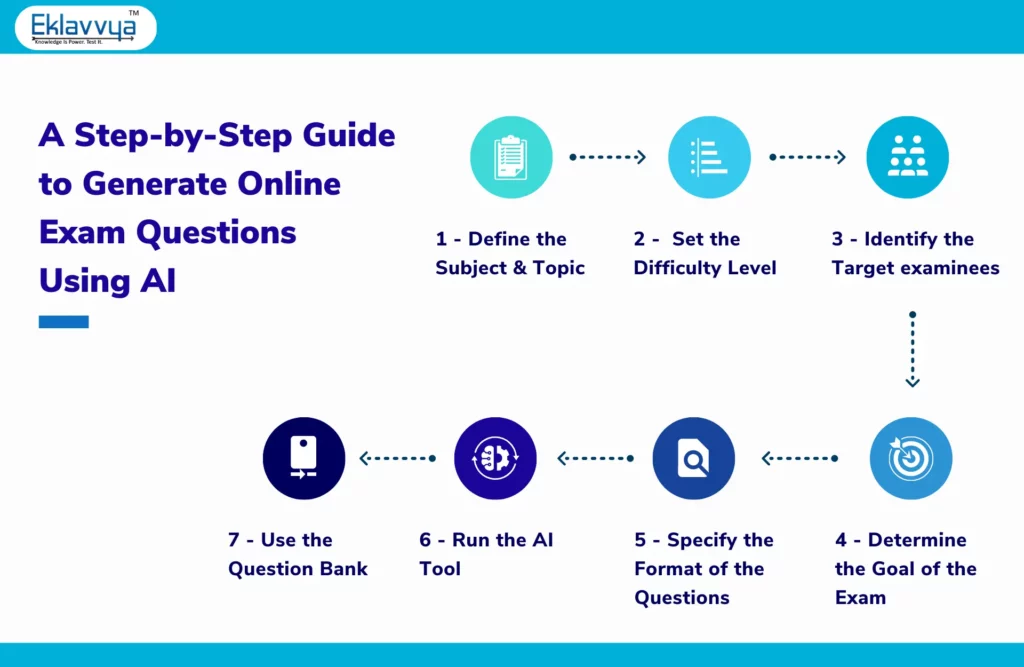
There are several methods to create question papers using AI, and the Eklavvya platform offers four types of question paper generation. You can generate questions based on parameters such as subject, topic, difficulty level, or criteria. Additionally, you can create questions from a specific paragraph; simply input the paragraph and let the system do the work.
Moreover, you have the option to upload your examination syllabus to the system. By providing a syllabus with subject-topic combinations and the required number of questions, the system will generate questions accordingly.
The platform also allows for question generation from audio or video formats. If you possess a relevant audio or video file and wish to create questions from it, rest assured it is possible. Furthermore, you can generate questions using internet links related to particular topics. Provide the link as input, and the system will produce suitable questions.
Step 1: Define the Subject and Topic
Before starting with the AI tool to generate a question bank, it is crucial to define the subject and topic of the exam. This step will give the AI tool a clear understanding of what context the questions should be generated in.
Step 2: Set the Difficulty Level
In this step, you need to set the difficulty level of the questions that you want the AI tool to involve in the required question paper. This will make sure that the questions are suitable for the intended audience and align with the goals of the exam.
Step 3: Identify the Target examinees
It is important to identify the target examinees of the exam as it will have an impact on the type of questions generated by the AI tool. For instance, if the exam is intended for management students, the AI tool will create questions that are relevant to the management students.
Step 4: Determine the Goal of the Exam
The goal of the exam will also play a crucial role in determining the type of questions generated by the AI tool. For example, if the goal of the exam is to evaluate the students’ understanding of accounting, the AI tool will create questions that test their understanding of accounting.
Step 5: Specify the Format of the Questions
You can specify the format of the questions that you want the AI tool to generate. For instance, you can request the AI tool to create multiple-choice questions or questions related to coding. Advanced AI tools support Subjective, Objective, Multiselect, Fill in the blank, true or false, and coding questions.
Step 6: Run the AI Tool
Once you have provided the input parameters, you can run the AI tool to generate the question bank. The AI tool will create questions based on the input parameters and align them with the goals and target audience of the exam.
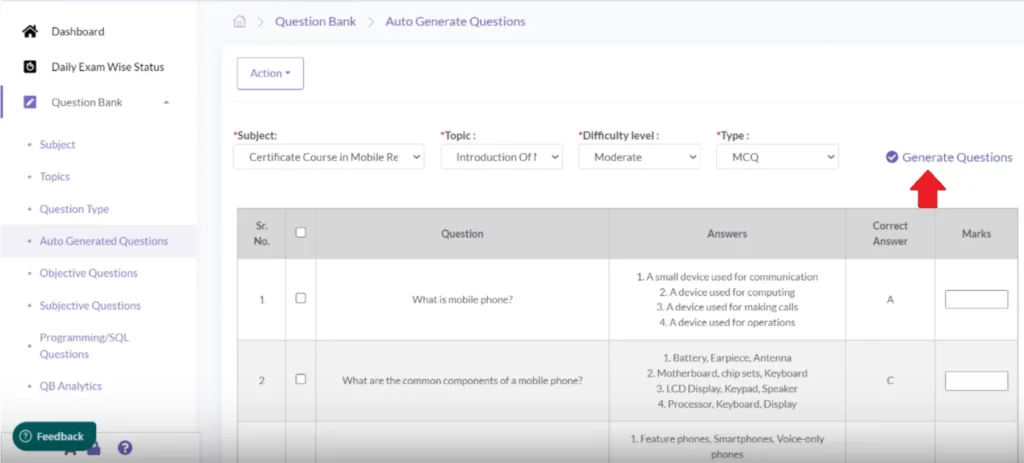
Step 7: Use the Question Bank
You can use it for your online or offline exams. As the tool selects questions from the existing question bank, the questions need not be verified.

Generate Questions Based on the Syllabus
AI systems can also be used to generate examination questions based on the syllabus. The system accepts the syllabus of the exam. Syllabus consist of various topics, subtopics and weightage associated with it
AI Question Generator would come up with a unique set of questions based on the syllabus of the exam. You can also define various attributes like descriptive questions, multiple choice-based questions, difficulty level, total number of questions, marks associated with the question.
Now task of the subject matter expert or examiner can be enhanced with the Question paper Generation process using Syllabus. You can define multiple question papers according to the syllabus which can be used to conduct exams, test series, and mock tests for the candidate.
AI-Powered Exam Preparation
AI can now aid you in your exam preparation, and eklavvya.ai is a prime example of such assistance. This online tool is specifically designed to help you prepare for various competitive exams and practice aptitude mock tests. By using eklavvya.ai, you can assess your analytical abilities and practice for numerous exams with the provided mock tests.
As an AI-powered platform, eklavvya.ai generates questions based on exam syllabi and mimics the actual competitive examination scenarios. This allows you to practice effectively using the mock tests supplied by the platform. Moreover, eklavvya.ai assists in analyzing your progress on a topic-wise and chapter-wise basis, enhancing your understanding of your own performance.
With the ability to compare your performance across multiple assessments, you can track your progress at the subject, topic, or subtopic level. Additionally, eklavvya.ai enables you to analyze the time taken for each individual question and examine the accuracy associated with each one.
The platform offers test mode, live mock test mode, and practice mode options. In practice mode, the system provides detailed answers and explanations for each question, streamlining your exam preparation process. In short, an advanced tool like eklavvya.ai makes preparing for exams significantly easier and more efficient.
Adaptive AI Exam Generator
You can also use Adaptive AI Assessment Technique to assess candidates for a particular topic. Generative or Adaptive AI assessment uses advance AI algorithm to probe candidates with next question based on main question context and answer provided by the user.
It is like having an interactive dialogan with AI bot about a particular topic. This approach is very useful for assethe ssing skills of the user including problem-solving ability, domain knowledge, depth of the knowledge.
Conclusion
The introduction of AI question paper generation offers a game-changing solution for exam preparation and administration. The ability to generate questions with high accuracy, efficiency, and customization options makes it a valuable tool for educators and exam administrators.
The traditional manual approach of question generation is time-consuming and prone to human error, while AI question generation offers a faster, more efficient, and consistent solution. With the increasing demand for exams to be relevant, diverse, and customizable, AI question generation is poised to replace the manual approach as the go-to solution.
In the future, it is highly likely that the use of AI for question generation will become the norm. The scalability, accuracy, and customization options offered by AI make it an invaluable tool for anyone looking to prepare exams efficiently and effectively. Applications of AI in Education are increasing. So, it is highly recommended that clients embrace this technology and incorporate it into their exam preparation process.


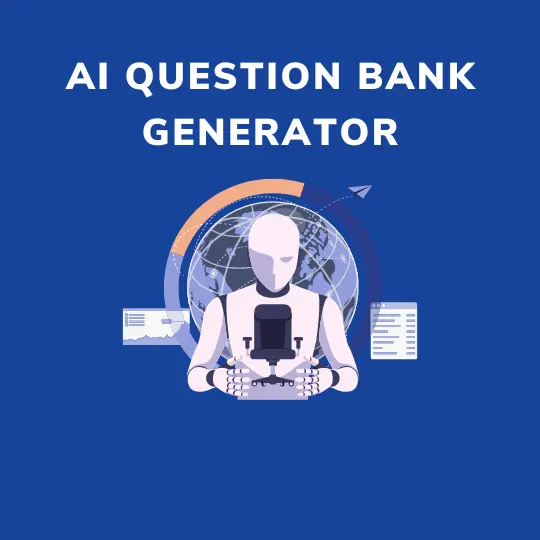

![How Government-Led Exams at 250+ Locations Are Setting New Standards of Integrity [Case Study]](https://www.eklavvya.com/blog/wp-content/uploads/2024/04/Enhancing-Exam-Integrity-Government-Certification-in-250-Locations-150x150.webp)
![Transforming Central Govt. Exams Evaluation: How Onscreen Marking is Leading the Charge [Case Study]](https://www.eklavvya.com/blog/wp-content/uploads/2024/04/How-Onscreen-Marking-Revolutionized-Central-Govt-Exams-Case-Study-1-150x150.webp)
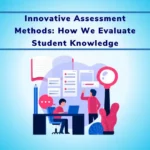
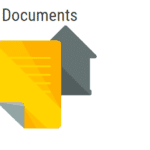











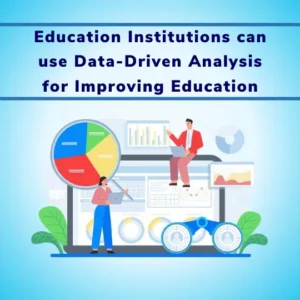

![How Onscreen Marking Revolutionized Central Govt Exams [Case Study]](https://www.eklavvya.com/blog/wp-content/uploads/2024/04/How-Onscreen-Marking-Revolutionized-Central-Govt-Exams-Case-Study-1-300x300.webp)
